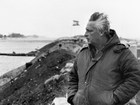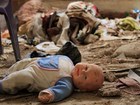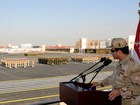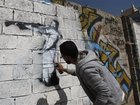Ariel Sharon, the former Israeli premier who died on Saturday at 85, leaves behind a controversial political heritage that has yet to be embraced by any of Israel's ideological camps.
Sharon was despised by the left for his unstinting support for the settlement enterprise and for masterminding Israel's disastrous invasion of Lebanon in 1982. He also fell foul of the right for his evacuation in 2005 of all troops and settlers from the Gaza Strip.
 Full Story
Full Story
A senior Palestinian figure labelled Israeli former prime minister Ariel Sharon, who died on Saturday, as a criminal and expressed regret he was never taken before the International Criminal Court.
"Sharon was a criminal, responsible for the assassination of (Palestinian president Yasser) Arafat, and we would have hoped to see him appear before the International Criminal Court as a war criminal," said Jibril Rajub, a senior official of the Fatah party.
 Full Story
Full Story
He paces back and forth outside the Syrian border crossing, growing more tense with every echoing artillery thud and machinegun blast -- his 14-year-old daughter is still inside.
When clashes erupted between two Islamist rebel groups in Tal Abyad she was across town at her aunt's house, he says. "I told her to stay there, that I will come tomorrow, or after tomorrow."
 Full Story
Full Story
Egypt's army chief Abdel Fattah al-Sisi stepped closer on Saturday to confirming a widely anticipated presidential bid, saying he would stand in elections if there was a popular demand, state media reported.
Sisi is easily the most popular leader in Egypt after toppling Islamist president Mohammed Morsi in July, and military officers have told Agence France Presse he had support within the army to stand in the election due to take place later this year.
 Full Story
Full Story
Former Israeli premier Ariel Sharon died in hospital near Tel Aviv Saturday after eight years in a coma, prompting a flood of tributes in Israel but contempt from Palestinians. He was 85.
"He's gone," his son Gilad told reporters at the Sheba Medical Center in Tel HaShomer. "He went when he decided to go."
 Full Story
Full Story
Egypt's powerful army chief General Abdel Fattah al-Sisi Saturday urged Egyptians to participate "in force" in next week's referendum on a new constitution, billed as the first stage in the nation's democratic transition.
On July 3, Sisi overthrew Mohamed Morsi after massive protests against the Islamist president's turbulent one-year rule. His ouster triggered unrest that has deeply polarized the country.
 Full Story
Full Story
An armed group clashed with Tunisian security forces after attacking their post on the border with Algeria, leaving one of the assailants dead, the interior ministry said on Saturday.
An 18-year-old man was killed and a customs agent was wounded in the attack that took place at the Bouchebka post overnight, said ministry spokesman Mohamed Ali Aroui.
 Full Story
Full Story
Residents of a militant-held city on Baghdad's doorstep began slowly returning on Saturday amid a tense calm.
Most businesses reopened in Fallujah and government security operations in nearby areas were put on hold after heavy overnight rain restricted the use of aircraft and heavy vehicles, a day after police and tribesmen retook militant-held areas in the nearby Anbar provincial capital Ramadi.
 Full Story
Full Story
Syrian troops seized a rebel-held town north of Aleppo Saturday and pushed toward part of Aleppo city, taking advantage of fighting between rebels and jihadists elsewhere, activists said.
"Regime forces have taken over the area of Naqarin and are advancing towards the industrial area of Aleppo city," said the Aleppo Media Center, a network of activists on the ground.
 Full Story
Full Story
Yemeni troops began to deploy in the northern province of Saada on Saturday to monitor a ceasefire between Shiite rebels and hardline Sunni Salafists, a security official said.
The deal brokered late Friday by a presidential commission ends fighting that erupted in late October centered on a Salafist mosque and Koranic school in the town of Dammaj.
 Full Story
Full Story



